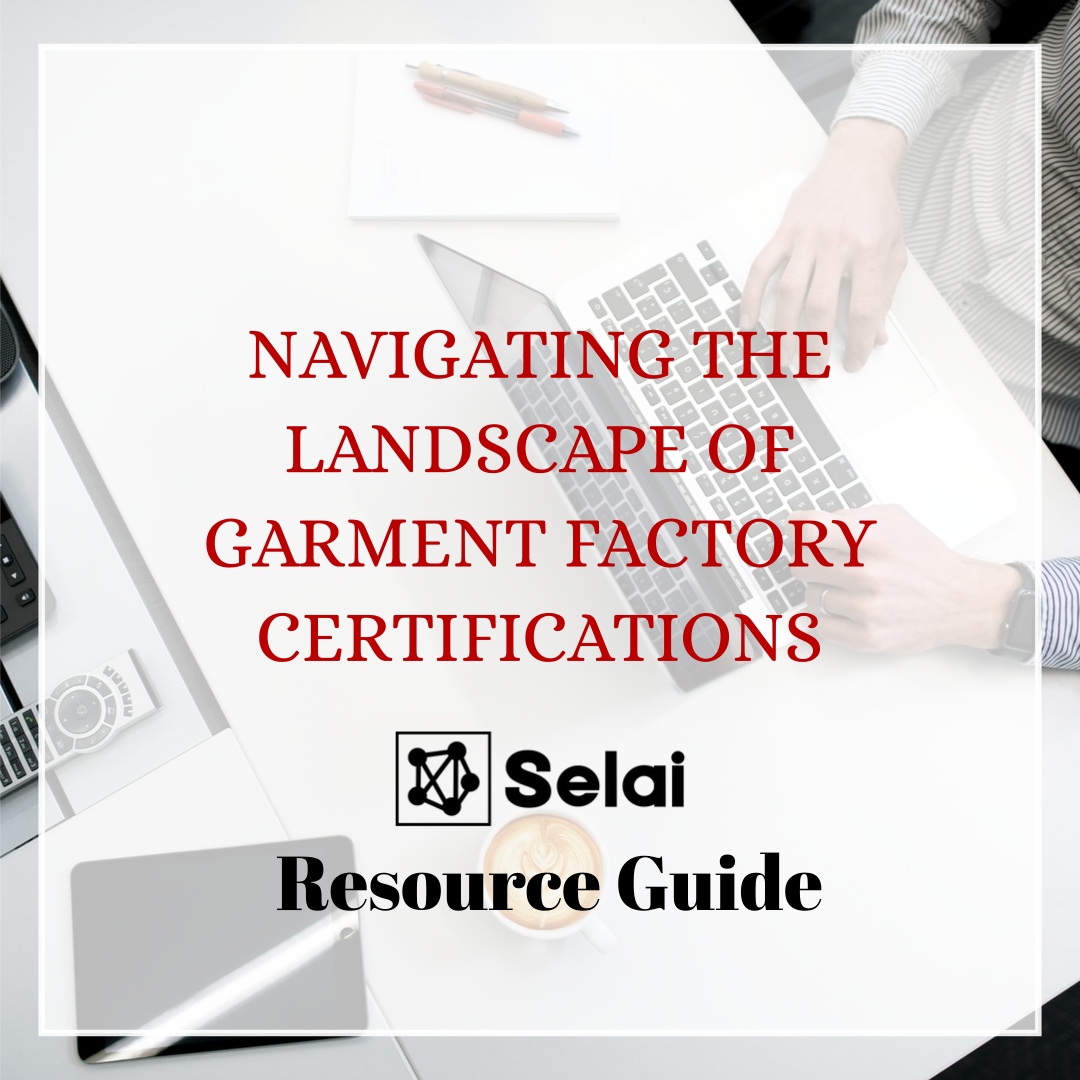
In the dynamic world of fashion and apparel manufacturing, the demand for transparency, sustainability, and ethical production has never been higher. With an increasing number of consumers making conscious buying decisions, brands are being held accountable for ensuring that their products are not only high-quality but also ethically made and environmentally friendly. But with a labyrinth of certifications out there, how can one differentiate between them or understand their importance? In this guide, we’ll unravel the intricate web of garment factory certifications, from social and ethical compliance to environmental standards and more. Whether you’re a brand seeking guidance, a professional in the industry, or a consumer aiming to make informed choices, this comprehensive guide will shed light on the myriad certifications that are shaping the future of fashion. So buckle up, and let’s dive into the world of conscious manufacturing!
Social & Ethical Compliance:
SA 8000 (Social Accountability): Developed by Social Accountability International, it focuses on enhancing workers’ rights and working conditions.
Website: https://www.sa-intl.org
BSCI (Business Social Compliance Initiative): A European monitoring system for ethical procurement of consumer goods.
Website: https://www.amfori.org/content/amfori-bsci
SEDEX SMETA (Supplier Ethical Data Exchange): A platform for sharing ethical data including labor standards, health & safety, and more.
Website: https://www.sedex.com
WRAP (Worldwide Responsible Accredited Production): Non-profit ensuring lawful, humane, and ethical manufacturing.
Website: http://www.wrapcompliance.org
FLA (Fair Labor Association): Promotes adherence to international labor rights through tracking and remediation.
Website: https://www.fairlabor.org
ETI (Ethical Trading Initiative): Alliance for ethical trade, enhancing workers’ lives worldwide.
Website: https://www.ethicaltrade.org
Accord on Fire and Building Safety in Bangladesh: Agreement to ensure safety in Bangladeshi garment factories.
Website: https://bangladeshaccord.org
Alliance for Bangladesh Worker Safety: Initiative to improve safety for Bangladesh’s garment workers.
Website: http://www.bangladeshworkersafety.org
Environmental Compliance:
ISO 14001: International standard driving companies to improve their environmental impact.
Website: https://www.iso.org/iso-14001-environmental-management.html
Bluesign System: Ensures the sustainable and safe production of textiles.
Website: https://www.bluesign.com
Oeko-Tex Standard 100: Certification ensuring textiles are free from harmful chemicals.
Website: https://www.oeko-tex.com
GOTS (Global Organic Textile Standard): Leading standard for organic textiles encompassing both ecological and social criteria.
Website: https://www.global-standard.org
OE (Organic Exchange): Advocates for the expansion of organic agriculture.
Website: https://textileexchange.org
REACH: European regulation on chemicals and their safe usage.
Website: https://echa.europa.eu/regulations/reach/understanding-reach
Higg Index by the Sustainable Apparel Coalition: Performance measurement suite for environmental and social impacts in apparel.
Website: https://apparelcoalition.org/the-higg-index
Cradle to Cradle Certified™: Product quality standard emphasizing a product’s circular lifecycle.
Website: https://www.c2ccertified.org
ZDHC Roadmap to Zero Programme: Initiative to eliminate hazardous chemicals in textiles and footwear.
Website: https://www.roadmaptozero.com
Quality Management:
ISO 9001:** Certification ensuring adherence to international quality management practices.
Website](https://www.iso.org/standard/62085.html)
Sustainable Materials:
RDS (Responsible Down Standard): Ensures that down in products comes from treated animals and is traceable.
Website:https://responsibledown.org
RWS (Responsible Wool Standard): Promotes welfare practices and traceability in wool supply chains.
Website: https://responsiblewool.org
BCI (Better Cotton Initiative): Makes global cotton production better for the people who produce it and the environment.
Website: https://bettercotton.org
Leather Working Group (LWG): Aims to improve the leather manufacturing industry’s environmental stewardship.
Website: https://www.leatherworkinggroup.com
STeP by Oeko-Tex: Certification for brands in the textile chain who want to communicate their achievements externally in a credible and transparent manner.
Website: https://www.oeko-tex.com
Specific Material & Process Standards:
FSC for Rayon/Viscose: Ensures sustainable forest management for wood-derived textiles.
Website: https://www.fsc.org
MSC for Ocean-derived materials: Promotes sustainable fishing and seafood traceability.
Website: https://www.msc.org
Other Compliance & Standards:
C-TPAT: U.S. Customs and Border Protection initiative to secure global trade.
Website: https://www.cbp.gov/trade/cargo-security/ctpat
Fair Trade Certification: Assures consumers that products meet rigorous social and environmental criteria.
Website: https://www.fairtradecertified.org
Rainforest Alliance Certification: Integrates rigorous criteria for human rights and environmental conservation.
Website: https://www.rainforest-alliance.org
Regional & Local Standards:
Green Button (Der Grüne Knopf): German government seal for products made according to high social and environmental standards.
Website: https://www.gruener-knopf.de
Ecolabel: EU label indicating environmentally-friendly products.
Website: https://ec.europa.eu/environment/ecolabel
Eco Mark: Japan’s label for products with a reduced environmental impact.
Website: http://www.ecomark.jp/english
China Environmental Labeling: Chinese eco-label awarded to products with less environmental impact.
Website: https://www.ccc-cn.org
Indirectly Related:
LEED: Leading green building certification program.
Website: https://www.usgbc.org/leed
ISO 50001: Supports organizations in all sectors to use energy more efficiently.
Website: https://www.iso.org/standard/60488.html
ISO 45001: Global standard for occupational health and safety.
Website: https://www.iso.org/iso-45001-occupational-health-and-safety.html
ISO 26000: Provides guidance on how businesses and organizations can operate in a socially responsible way.
Website: https://www.iso.org/standard/42546.html
EDGE: Building certification for emerging markets.
Website: https://www.edgebuildings.com
Green Globes: Provides a unique building environmental assessment.
Website: https://www.thegbi.org/green-globes-certification
BREEAM: Assesses, rates, and certifies the sustainability of buildings.
Website: https://www.breeam.com
WELL Building Standard: Tool for advancing health and well-being in buildings globally.
Website: https://www.wellcertified.com
Carbon Trust Standard: Recognizes organizations for reducing carbon emissions.
Website: https://www.carbontrust.com/what-we-do/certification/carbon-trust-standard
Forest Stewardship Council (FSC) Certification: Ensures products come from responsibly managed forests.
Website: https://www.fsc.org
Remember that certifications can evolve over time, and it’s always wise to refer to the official websites for the most up-to-date information.
